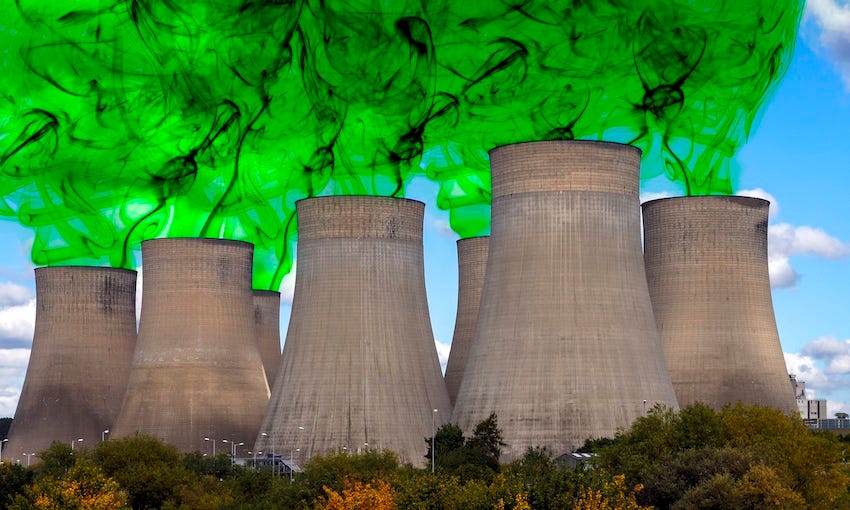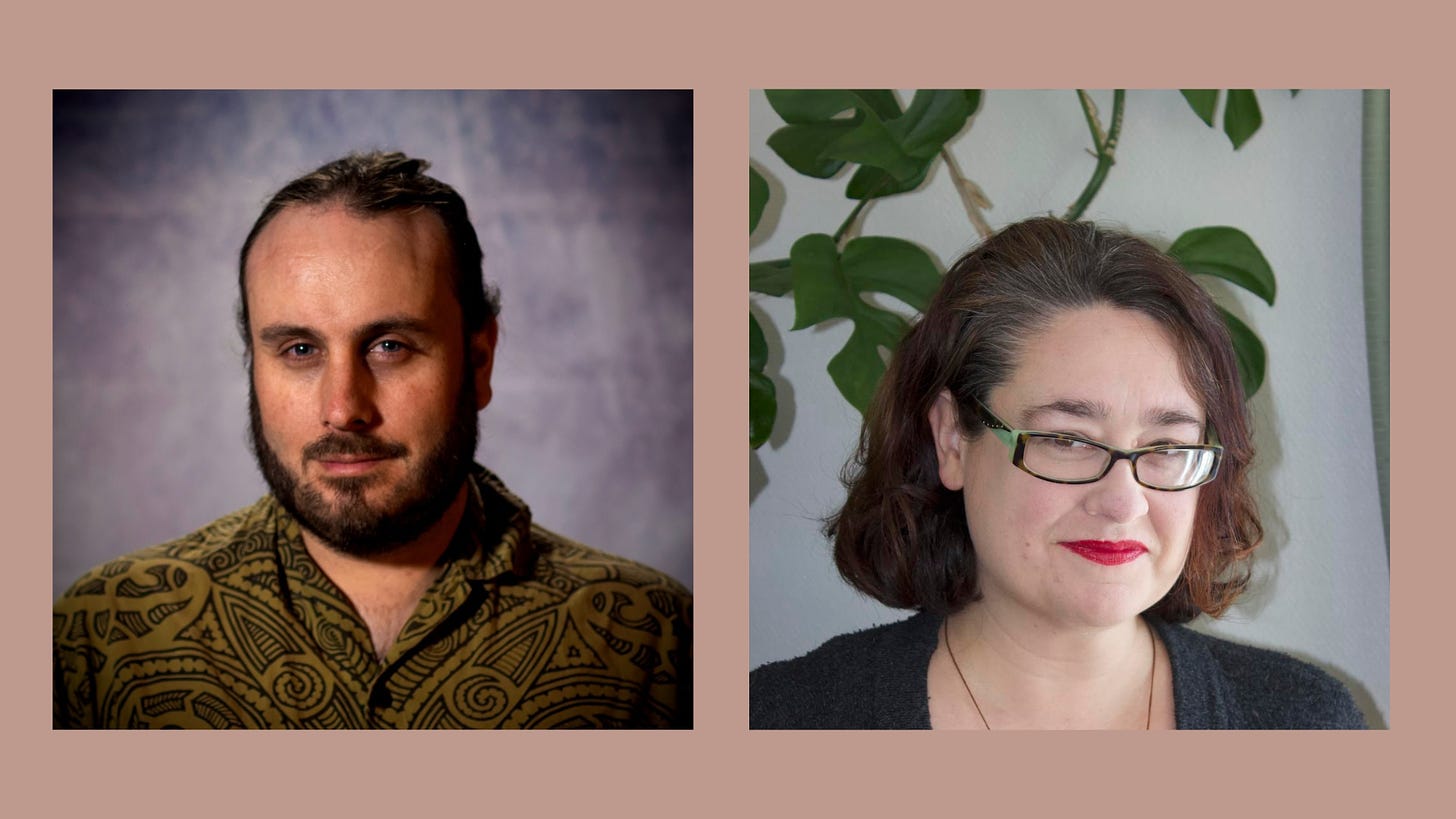The next big target for disinformation? Climate change
'Take a beat, stop, think, find some quality information before you waste your time on bullshit.'
Kia ora, welcome to Future Proof. I’m Shanti Mathias, a Spinoff staff writer standing in for Ellen this week while she’s off on a magnificent adventure. Thanks for joining me!
In 2023 last year, an American speaker came to visit New Zealand. He did some talks at community-hall type locations around the South Island. He was interviewed on the radio. Then he went home.
Foreign speakers come to Aotearoa all the time, but researcher and author Byron Clark did some more digging. “[Farming group] Groundswell invited this American scientist, Tom Sheehan, to talk about how methane doesn’t contribute to warming,” he says. “It’s part of a widespread effort to create disinformation about methane emissions in New Zealand, which are a major portion of our carbon emissions.”
Clark has conducted research into the embedded ecosystem of conspiracy theories, especially those that became prominent during the Covid pandemic; conspiracy connected radio station Reality Check Radio has a show called “Greenwashed” that often spreads doubt about UN sustainability goals, city density, sea level rise and emissions counting. Now, with most restrictions around Covid gone, some of those groups are turning their attention to the climate.
“There’s a lot of fear mongering around the climate response, and those ideas spread fast,” Clark says. “The climate response is treated like a grand plot, a means to control people.” While some of this information is on niche channels like Reality Check Radio, Sheehan was also interviewed on Newstalk ZB; gradually, these ideas can make their way into broader society.
This disinformation can be actively harmful to the climate movement, especially when people who don’t believe in climate action influence political decisions. That’s why Clark and teacher and librarian Mandy Henk are running a Climate Disinformation Night School at non-profit Tohatoha, beginning in April.
“Bringing [Sheehan] to the country is an example of community education – it’s just from another side,” Henk says. Community or folk education, with groups of people getting together to learn about things that everyone can benefit from, has a long tradition, including in the Appalachia area of the US, where Henk is originally from. “It’s a powerful way to build community – we want to make this friendly to people in the climate movement, activists and advocates.” The course will be delivered with short recorded lectures, then longer discussions, with times that work for both evenings in the US and in Aotearoa.
Disinformation is a “messy term” and difficult to define, Henk says. “The way I conceptualise it is that disinformation is an overall tactic, designed to create division and confusion and organically spread narratives.” There’s the kind of conspiratorial disinformation that Clark researches, but there’s also more traditional propaganda, often spread by fossil fuel companies in mainstream media, without resorting to Telegram channels and alternative radio stations.
Many fossil fuel companies promote the idea of widespread geoengineering, instead of cutting emissions, in order to stymie accusations that they are responsible for climate change. These companies have profited from coal, gas and oil while spending money on advertising that denies global heating, for decades. Often, the denial of climate science is just to procrastinate action, over and over again.
Regardless of the source, climate disinformation and propaganda is dangerous, but that doesn’t mean people are helpless. “It’s not much value saying [disinformation] is a problem if we don’t have solutions,” Henk says. If there’s one thing the last few years have created, it’s lots of cause for research into countering disinformation. So what’s the best way to respond to climate information you’re not sure about, or to people who are sharing it?
“There are two things to internalise: first, figure out who is behind the information, who is funding it, what does the evidence say?” Henk explains. But if you’re seeing something that is confusing or provoking, you can also simply exercise some “click restraint”.
“Take a beat, stop, think, find some quality information before you waste your time on bullshit.”
Henk and Clark hope that people who take part in their course will come out of it with strategies to individually respond to disinformation, as well as to make their movements or organisations responsive to it as well. “We want to give people tools to engage in this topic, and be smart and strategic about it,” Henk says.
Help us understand you better! Take The Spinoff survey and dive into a chance to win big – we're giving away three $400 Prezzy Cards!
Your insights matter, and as an independent media company, we value your feedback to enhance your experience. It's quick, anonymous, and your email is only for the prize draw.
Click here to take the survey.
Could we set a legal precedent against greenwashing?
Consumer New Zealand and other groups are currently seeking a High Court declaration that fossil fuel company Z Energy has engaged in greenwashing. This would go against the Fair Trading Act. About 40% of New Zealanders think fossil fuel advertising should be banned, and parliaments in the EU and Canada are examining laws that promote companies as sustainable, often with little or no evidence. Monitoring or limiting fossil fuel advertising could be one mechanism to force fossil fuel companies and other polluters to stop engaging in profiting from products that damage human health and the planet. This article by legal expert Matthew Hall in The Conversation discusses how legal threats could be an increasing risk for fossil fuel producers as consumer sentiment changes.
New Zealand grass seeds sent to the vault
As the climate changes, it’s essential to have back-up of seeds, especially seeds that contribute to our food. One of the places for this is Svalbard, a remote Norwegian archipelago that is one of the most northern inhabited areas in the world. New Zealand has just sent some types of clover and ryegrass, pasture grass species, to the Svalbard seed vault. One reason for preserving these seeds is to have a backup of genetic diversity that can help find adaptable plants to changed climate conditions. If you’re interested in seedbanks more broadly, this is a great podcast about Svalbard and the history of seed gathering in hungry times.
Palmerston North’s buses are fully electric
As of Monday, the buses in Palmerston North are all electric, a first for any New Zealand city – and good news for reducing air and noise pollution. While private electric vehicle sales have reduced since the clean car discount ended last year, electric buses are still popular with public transport services: an electric bus saves an average of 5.3 to 6.2 tonnes of CO2, and after being charged overnight, they can travel up to 350km a day. As well as reducing emissions, taking the bus is a good opportunity for equity: not everyone has access to cars. There are now several hundred electric buses in New Zealand with the most in Auckland.
More stories:
Why climate change means South Island gardeners are reimagining what they grow
New Zealand is banning ‘forever chemicals’ in cosmetics. Is it time we do the same for textiles?
How the El Niño Southern Oscillation will supercharge temperatures around the world in 2024.
Environmentalists are worried that these projects will be first on the list of fast-tracked. rules changing consenting guidelines in Aotearoa, including mines on conservation land.
Allison Hess investigates the mystery of the murdered robins in Wellington’s forested Waimapihi Reserve.
I’ve been really enjoying the podcast No Books on a Dead Planet, where the hosts read and discuss different books about climate change – so you don’t have to. Lots of good book recommendations in there, both novels and non-fiction.
Bangladesh spends 7% of its annual budget on climate adaptation - which still might not be enough.
Why hemp is an excellent sustainable alternative to concrete.
Can AI help improve and monitor climate policy?
Financial support from our audience is essential to ensuring our work continues
When there’s a shock resignation, an election or rats take over the supermarkets, we know our community comes to The Spinoff to make sense of the world in the best and worst of times. We're committed to telling stories about Aotearoa, for Aotearoa, with rigour, range and humour. If that’s something you value, we’d love for you to consider becoming a Spinoff member or donating. If you're reading this and are already support us, a huge thank you from all of us.
Mad Chapman, The Spinoff editor
Finally, sound waves are invisible but can make a big difference, especially underwater and under the earth. New research from Australian scientists has shown that playing sounds at up to 90 decibels can improve soil health and encourage organic matter to decompose; meanwhile, researchers are using underwater speakers to broadcast the bubbling, squeaking sounds of healthy coral reefs, in an effort to encourage coral polyps to keep growing.
Resoundingly, Shanti









